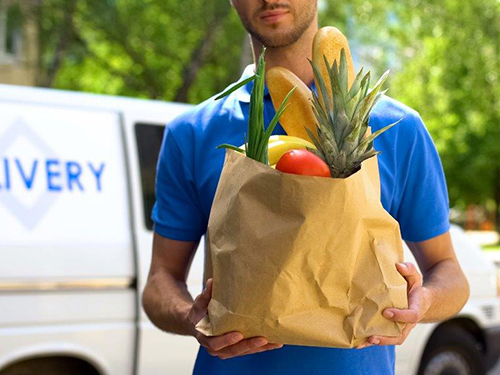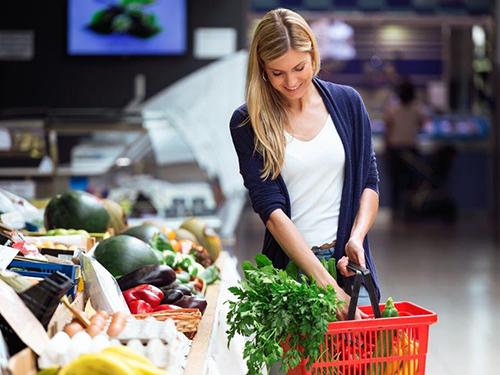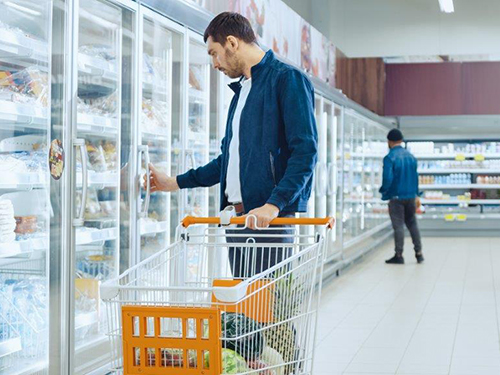
Fact Sheet FS585
Foodborne illness is a critical subject all year long, but it is especially important during the hot summer months. Keeping your family safe depends on you! No matter how carefully a food is handled before you buy it, if it is handled improperly while shopping, spoilage or contamination may occur. Making sure that this does not happen begins in the local supermarket. By following these simple guidelines, you can reduce your risk of foodborne illness.
Fresh Meats and Poultry
Fresh meats and poultry may contaminate other grocery items. The best way to prevent this “cross-contamination” is to always keep fresh meats and poultry separate from other items. One way to do this is to put packages of fresh meat or poultry in the plastic bags used for fresh produce. Never place a wet, leaking package of meat in the grocery cart where it might drip on other items. Most importantly, don't let packages of uncooked meat or poultry touch fresh produce or any other food that you won’t cook before eating. After you have taken uncooked meat or poultry items from the refrigerated or frozen food case in the supermarket, you should cook, refrigerate, or freeze them within 2 hours. In warmer weather (from April through October, and especially in July and August) the time limit drops to 1 hour or less. Meat and poultry should be the last items that you pick up on your way to the checkout.
Precooked Foods
Handling precooked foods properly is very important. If you mishandle these ready-to-eat foods, a serious case of foodborne illness might result. Packaged, precooked foods should be purchased only if the package is completely undamaged—no tears, holes, or open corners. Buy ready-to-eat refrigerated foods only if they are actually in a refrigerated case and if they feel cold to the touch when you pick them up. Never purchase unpackaged precooked foods from a deli case where other foods are touching meat or poultry items. Always observe the cleanliness of the deli and behavior of the deli worker before purchasing precooked foods. A clean deli will have clean meat slicers, countertops, cutting boards, and floors. Make sure that the employee packaging your deli purchases cleans his or her hands with soap and water between handling different food items. The deli worker should not lay your food on the bare counter before putting it into your package.
Refrigerated or Frozen Foods
You should purchase food products labeled “keep refrigerated” only if they are being stored in a refrigerated case. Purchase dated packages only if the label sell-by, or use-by date has not expired. Buy frozen products only if they seem to be completely frozen to the touch. Do not purchase more refrigerated or frozen food than you have room to store at home. In hot weather it is best to pack all refrigerated, frozen, or raw foods in an ice chest for the trip home. This is especially true if the time between leaving the store and arriving at home will be more than 1 hour. It is best if the grocery store is your last stop on the way home. Remember that even short stops during hot weather may let your groceries warm up to unsafe temperatures while sitting in the car, leading to spoilage and the possibility of food borne illness.
A Note about Date Labels
Package date labels can be very confusing. Most date labels are for food quality and not food safety. “Sell by” dates are used by the manufacturer to recommend to the store when a product should be sold to a customer for best quality over its expected shelf life. “Sell by” dates do not indicate food safety. “Best by” dates indicate to the customer when the manufacturer ensures the product will have its best quality, and it is also not meant to indicate food safety. “Use by” dates are also set by the manufacturer to indicate to the customer when the product is at its peak quality. Eating food after its “best by”, “use by” or “sell by” date means that the product might not taste as good as if it was fresh, but should not indicate any food safety concern.
One important exception concerns infant formula. Since infants get their sole nutrition from infant formula, and the nutrients in any food can degrade over time, infant formula should not be used after its “use by” date, since it could result in life threatening malnutrition for the infant.
If You Observe Problems
Any time you observe unsafe conditions in the grocery store, notify the manager. Report any damaged, open, or unrefrigerated items. Inform the manager of any unsanitary conditions, past-due expiration dates, or other problems. If you have done this but are still dissatisfied, report the problem to the municipal health department listed in the blue pages of your phone book or online. By following these suggestions, you might prevent the problem from going unnoticed and causing others to become ill. Remember, the next time YOU could be the unsuspecting victim of foodborne illness. These suggestions for safe food shopping are the first step in preventing foodborne illness in your home.
If Using a Grocery Delivery or Meal Kit Service
Before ordering your groceries from a company or using a meal kit, be sure to do some research online or call the company to ask about their food safety standards. Ask them how they ensure the food arrives to you safely and what you should do if you are unsure about the safety of a delivery. Be sure to arrange for food deliveries when someone is home so the food can be refrigerated quickly. If no one will be home, designate a safe place for the food delivery. A place that is cool, with plenty of shade, and limited access for rodents and pests is ideal.
When you open the delivered food be sure to examine the box, and check to see that there are no leaks or spills. Also check to see that cold items such as meats, seafood, poultry, and dairy are cold to the touch (ideally use a thermometer and make sure it is 40°F or less). Refrigerate or freeze food as soon as it is delivered. Send back any food of uncertain food safety including frozen food with large ice crystals where the food may have been thawed and then refrozen, or food that is not at the correct temperature. Cold food should be under 40°F, and hot foods should be above 140°F.
For More Information
Photo credits: iStockphoto.com
November 2019
Copyright © 2024 Rutgers, The State University of New Jersey. All rights reserved.
For more information: njaes.rutgers.edu.
Cooperating Agencies: Rutgers, The State University of New Jersey, U.S. Department of Agriculture, and Boards of County Commissioners. Rutgers Cooperative Extension, a unit of the Rutgers New Jersey Agricultural Experiment Station, is an equal opportunity program provider and employer.



